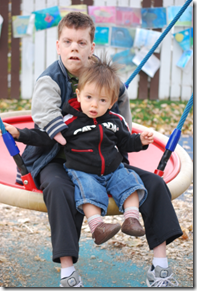One of the many parenting challenges that can leave even the best parent at a loss is what to say to your kids when they see someone with special needs. Especially when they react in inappropriate ate or insensitive manner.
ate or insensitive manner.
My brother has special needs. He is a bilateral amputee with a rare syndrome called Cornelia de Lange syndrome. He looks different. Even the littlest kids can see that there is something different. So suffice to say I have a lot of experience in this area.
Kids react to seeing people with special needs in a lot of different ways. Some cry, some point, some laugh, and some are truly scared and some are simply curious. I promise you that no matter what you child does, it is probably not the first time and it will certainly not be the last time that it has happened to that family.
Parents have a lot of different reactions too. Some parents just tell their child to be quiet and stop staring. I understand this impulse but you do miss out on a great learning opportunity. I find it the most awkward when parents just ignore their child’s comments. But I understand that they just don’t know how to deal with it.
So, what should you do? The first thing to remember is that kids are naturally curious. They’re not usually trying to be rude. Most parents and caregivers would like you to help your kids understand that people with special needs are people too and deserving of our respect.
If they are scared, comfort them. It’s natural for kids to worry that people may be hurt or be frightened of things that they don’t understand. With my brother, kids are often worried that my brother’s arms have broken off, that he is really hurt or that it could happen to them. I usually try to reassure kids that he is not actually hurt and that some people are just born different. I also point out that even though he doesn’t have any fingers, he still has feet. Pointing out things that they do share somehow reassures a lot of kids.
If a kid is just curious, I’ll encourage my brother to say hi. This is actually what I would suggest you do with your kids too. Just say hi. For the little ones, this may be enough. Kids who are a little bit older will probably have questions. Ask if it’s okay for them to ask some questions. Not e veryone will have the time or the patience, but many people will.
veryone will have the time or the patience, but many people will.
There was one time that even I was at a loss for words. We were at a conference for kids who are multiple amputees and we were sitting beside a boy who was about two years old. He had one finger on one hand and one and a half fingers on the other hand. He pointed at my brother and said to his Dad “That boy doesn’t have any fingers!”. I guess in his world everyone has fingers, he just hadn’t noticed that most people have 10 yet. It just goes to show that no one is exempt from having to deal with this with their kids.